August 22nd, 2015 by Rachel | Tags: Culture Exchange, Disability, Peace Corps | 1 Comment »
Timing couldn’t have been more perfect. I recently finished reading Sheryl Sandberg’s book, “Lean In.” This book speaks about gender inequality that still exists in the United States. While women in the United States today have more choices than ever when it comes to deciding how to live their live, they are still facing barriers in receiving support to fulfill their career goals and a tremendous amount of responsibilities in caring for their families and home. Sheryl explained how men need to share more responsibilities with their spouse in caring for the family and the home and how workplaces need to provide family benefits for both women and men because it is both economically smart and the right thing to do. She shared in a great detail about how men can be the best partners for women and help change the gender inequality which includes splitting the household and childcare responsibilities, creating policies at workplaces that help women advance their careers and earn an equal pay, and encouraging more women to be interested in fields that are dominated by men such as technology and engineering.
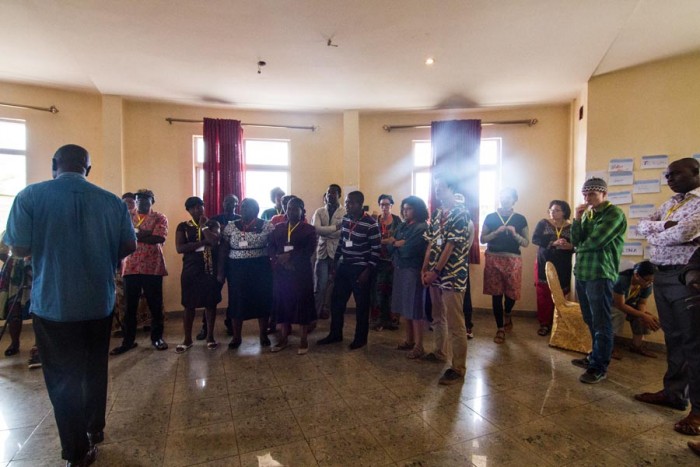
Peace Corps Volunteers and Cameroonians participated in a variety of activities to learn how to improve gender equality.
Like the United States, Cameroon faces gender inequality but women face far more issues due to both lack of policies supporting women and understanding how to treat women with respect. To help improve the gender equality in Cameroon, Peace Corps recently hosted a three-day Men as Partners workshop. The goal of the workshop was to educate women how to advocate for their rights in protecting their sexual reproductive health and asking men to share household responsibilities and educate men how to respect women, share responsibilities with them and support them in their advocacy for gender equality. All Peace Corps Volunteers who attended the workshop brought one or two Cameroonian work partners with them. I brought Ruth, my official Peace Corps counterpart, and a deaf man who works in disability advocacy, Tabod.

Tabod, a deaf man who advocates for disability rights, attended the Men as Partners workshop.
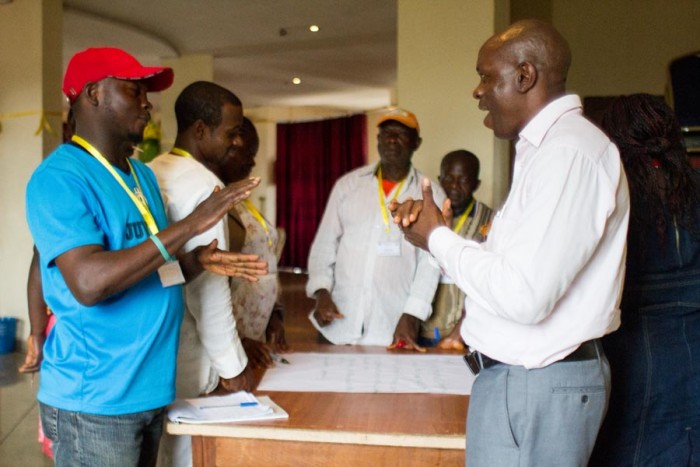
Peace Corps provided an interpreter for Tabod so that he could have the opportunity to attend the workshop and participate in all activities.
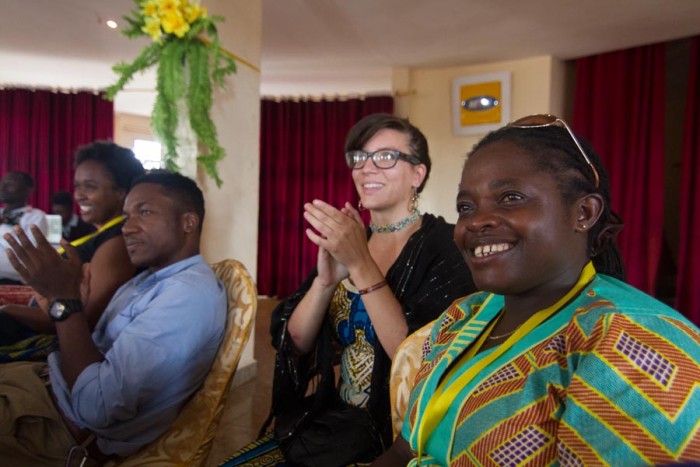
Ruth, official Peace Corps counterpart, participates in the workshop.
While we covered a wide variety of topics including how women feel about men and how men feel about women and sexual reproductive health, how improving gender inequality can reduce the transmission of HIV/AIDS, Peace Corps Volunteers and Cameroonians exchanged their own different cultural viewpoints. For example, during an activity called “Looking at our Attitudes,” there were five different signs on the wall: Strongly Agree, Agree, Neutral, Disagree, and Strongly Disagree. We were asked various questions relating to our attitudes towards women. When we were asked, “Women who wear revealing clothing are asking to be raped,” all Americans went to the sign, “Strongly Disagree” and all Cameroonians except for two went to the sign “Strongly Agree” or “Agree.” The two Cameroonians went to the sign, “Neutral.” One has to keep in mind the viewpoints of these young Americans’ at the workshop do not represent the viewpoints of all people in the United States but I do believe that our viewpoints do give a good representation of the majority of young people in the United States. There is a definitely a growing trend of young Americans speaking out against rape, especially on college campuses. In any case, seeing our viewpoints on whether or not revealing clothing do ask for rape did lead to a fiery debate. We, Americans, explained to the Cameroonians that regardless of any circumstances, there are no excuses to why people are permitted to rape. We also had a discussion on what sexual consent means and a number of Peace Corps Volunteers explained that when one says “No” to sex, it means “No” and people have no right to force sex on people. Many of us, Americans, felt that there is a long way to go in educating Cameroonians about sexual assaults.
In spite of some cultural differences, we also did find some common viewpoints. For example, when we were asked, “A woman who carries a condom in her purse is ‘easy,'” majority of the participants stood by the sign “Strongly Disagree.” Only two stood by the sign, “Neutral.” When we were asked, “When a woman is pregnant, preventing HIV to her child is her responsibility since she carries the child,” and “A man is more of a “man” if he has many sexual partners,” all Americans and most Cameroonians stood by the sign, “Strongly disagree.” When we were asked, “It is okay for a man to have sex outside of relationship, if his partner does not know about it,” all Americans except for one and all Cameroonians except for one went to the sign, “Strongly Disagree.” The two went to the sign, “Neutral.”
We then did an activity where we had to identify which household responsibilities men and women were responsible for. Cameroonians showed that women are responsible for most household responsibilities and hold more responsibilities than men. Peace Corps Volunteers then shared that men and women are responsible for all household chores and not one chore should be exclusive to one gender.
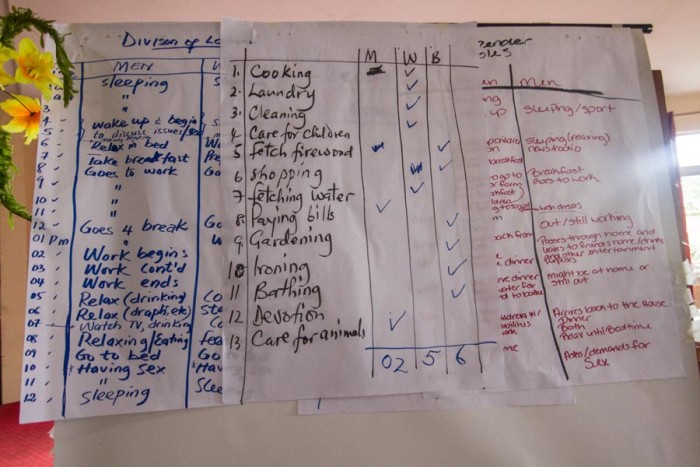
This chart shows Cameroonians’ perspective of which gender is responsible for household chores.
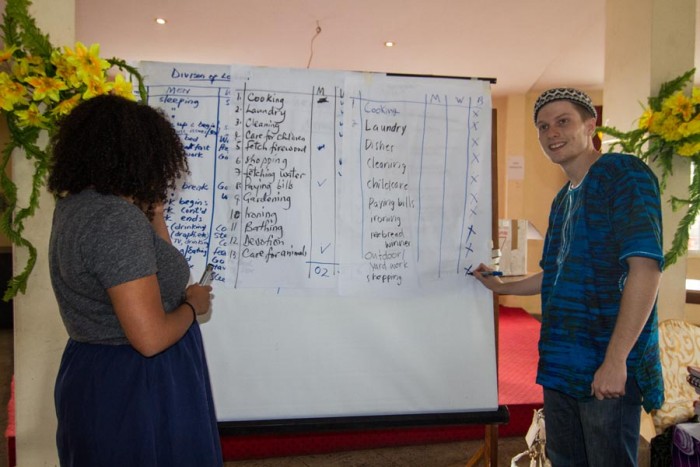
Peace Corps Volunteers shared their American perspective of which gender is responsible for household chores.
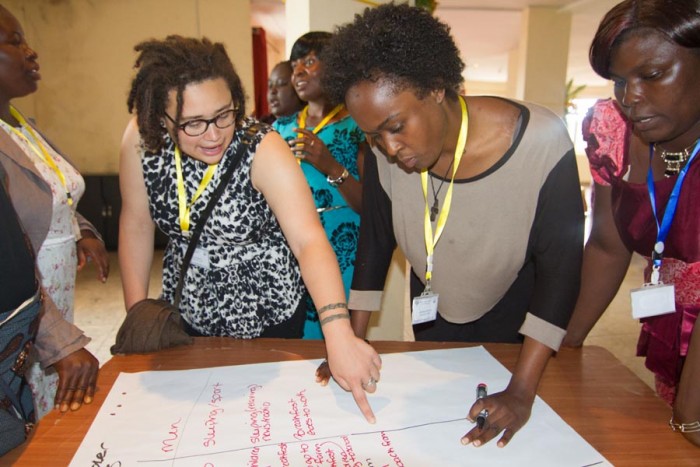
Female participates discuss what is the typical daily schedule for women and also men.
We also did an activity called “Gender Fishbowl” where women had to sit in a circle and men had to sit outside of the circle. Women shared their feelings about how men interact with them, their struggles in being a women and how men could be better partners. We then reversed by having men sit in middle of the circle and women sitting on the outside of the circle. Men shared their struggles of being men, what was difficult to understand about women and how they can be better partners for women.

Participants engage in activity called Gender Fishbowl which gives females the opportunity to share their viewpoints on men and vice versa.
Men as Partners has been far my most favorite workshop Peace Corps has offered. This workshop really gave us, the Americans, the opportunity to educate the Cameroonians about how we can advance gender equality and also learn Cameroonians’ perspective on gender roles. If Peace Corps offers this workshop again before I leave Cameroon, I will most certainly attend again but bring different Cameroonian work partners so that I can provide more Cameroonians the opportunity to learn about gender equality.

1 Comment
Kay
August 23, 2015 at 11:22 am
Wonderful workshop. This reminded me of the 1970’s when we held workshops for women and men called “raising consciousness”. We did the same thing you did but also emphasized that women had a right to work, to share the upbringing of a child with their men and that she was a person in her own right. It was an uphill battle in those days. Did you know that if a woman divorced during the early 1900’s, she lost custody of her child? she also had no income at all-not her own money which became her divorced husband’s money, and, of course, there was no social security. Keep fighting, Rachel.